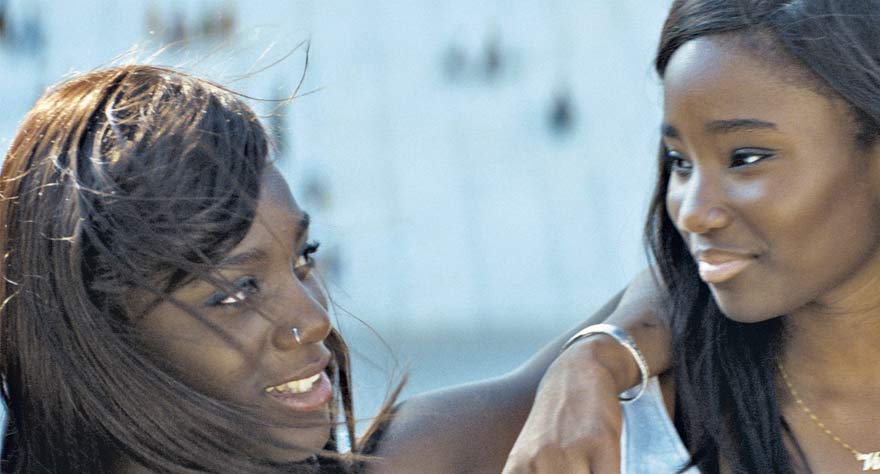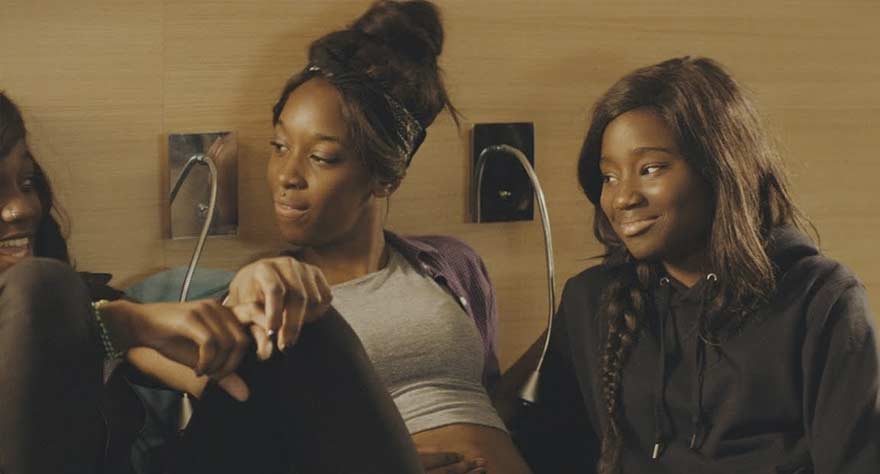
Self discovery is a long process, and 'Girlhood' honors that as much as a two-hour film can hope to.

Self discovery is a long process, and 'Girlhood' honors that as much as a two-hour film can hope to.
Girlhood, if anything, is the coming-of-age genre’s attempt at exploring those pivotal teen years by way of mood. The dysphoria, the sense that growing wiser sometimes comes hand in hand with the world growing smaller—these are the strokes with which French director Céline Sciamma paints the life of Marieme (Karidja Touré), a 16-year-old girl living in a poor suburb outside Paris.
Sure, Marieme, treads familiar water: failing out of school, falling in with the wrong crowd, and awkwardly navigating first love, but it’s the environment more than the events that makes her circumstance feel heavy and suffocating. Just as American Beauty had an affinity for the color red, Marieme’s world here plays with hues of teal and a deep, somber blue. Some scenes just use accents of color in the clothing or walls, but others are washed over in a dark blue overlay—one pivotal scene finds Marieme and her friends disengaging from school yard fights long enough to get all dolled up in a hotel room they’ve rented for the night (surely, their little refuge from the world). The girls sing along shamelessly to Rhianna’s “Diamonds”—the whole song—as if for three minutes of their lives, this is who they choose to be. The effect feels like something of a dream state, like these girls who fear their fathers and brothers at home as they suffer endless abuse, can come alive—but only under the cover of shadows. That’s what the world has left for them.
The rest of the film is anything but diva like, relying on the ordinary: wandering the malls, small-town gossip and fights with rival cliques. This world exists largely in veils of teal—the walls to the room Marieme shares with her sister, the hospital where her mom works as a janitor, the insides of the school counselor’s office as she’s told maybe she should consider vocational school. The color makes one feel exactly as expected: a little off, sickly, uneasy.
If all that isn’t dizzying enough, the film’s lead song, “Girlhood” by Para One, serves as both a transition between scenes and an audible manifestation of Marieme’s anxiety. The bright synths repeat quick eighth notes that hold a certain excitement about new directions—in some ways, falling in with the “wrong” crowd is the best thing that happened to Marieme as it coincides with a slow but certain development of her confidence—but like all uptempo songs, there is also a sense that things might break under pressure. Marieme likewise can never quite find solid ground, choosing to uproot herself from one unhealthy living environment after another. The art direction and music combined give the sense that it’s not just tough odds Marieme must overcome, but the pervasive feelings of confusion and hopelessness that threaten to consume her.

But let’s get this straight: this isn’t a tale of hope and strong-willed determination, a young female knowing what she wants and going after it. Sciamma’s Marieme is more layered than that. It’s actually difficult to pin down who she is until the movie’s end, if even then. As she falls in with her new group of friends, it’s hard to tell if this whole tough-girl act is an appeal to fit in or who she already had become. Sometimes she appears timid and reserved and other times she seems bold and self-assured. Touré proves an astute actress for navigating the worlds of innocence and experience (often at the same time), especially in scenes with younger sister Bébé (Simina Soumare), who serves as a foil for innocence and a bit of a reminder that Marieme’s story will be repeated again and again.
As compelling as Marieme’s relationship with her sister is—not to mention the beautiful character arc created in her engagement with the world in the safety net of a gang of friends—the film’s second half struggles to maintain the same levels of tension and insight. Moving out on her own, all of the complex character relationships are abandoned for would-be antagonists who are never really developed enough to fear. We get the film’s first archetypes, and Marieme’s strides to rise above mean a bit less when her monsters feel faceless. Certainly the day-to-day grind is monotonous, but making this point doesn’t seem to be the narrative’s goal. As the film’s momentum wanes, somehow the issues she faces get more dramatic: bosses who don’t respect boundaries, boyfriends whose expectations fall in line with overarching patriarchal paradigms, and questions about what a girl faced with tough choices will do. But none of these questions seem to resonate. Maybe it’s because the film, while lovely in its portrayal of one girl, struggles when trying to say too many things about the world outside that girl.
But the biggest battle here is with herself, and fortunately this is where we return by the movie’s end. And the payoff feels real. Marieme’s story is a constant game of taking two steps forward and one step back, and yet even without clearcut promises, her path to discovery feels authentic and brave—in the adult sense of the word, when bravery is about considering more than immediate comforts. Self-discovery, when it’s tackled honestly, is a long process, and Girlhood honors that as much as a two-hour film can hope to. Coming-of-age stories sometimes put too much emphasis on nailing down the specifics to that daunting question “What do I want for my life?” Maybe true strength comes from staring that question right in the face and saying, “Not this.”